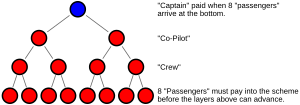| United Nations Framework Convention on Climate Change (Photo credit: Wikipedia) |
You can mix MLM with almost any business that needs a lot of consumer-level marketing, In the past several years, there has been some attempt to create multi-level "carbon credit" MLMs. So what exactly is a carbon credit?
A carbon credit refers to any sort of trade-able certificate that permits the emission of one ton of CO2 or any equivalent greenhouse gas. Now you're probably going... Why would ANYBODY want to buy that? Good question! To understand that, we have to take a sidetrip to discuss global warming.
Basically, the globe is warming (how much and how fast is subject to some debate) due to all the carbon emissions we're putting into the air from all the fossil fuel we've been burning. And the warming ocean is not good for us in the long run, so United Nations created a framework in 1997 called UNFCCC which established a global quota on how much carbon emissions is allowed for each country. This was signed in Kyoto, Japan, so it's known as the Kyoto Protocol. 192 different states signed, and it was formally adopted in 2005 by the UN at Montreal (see logo above).
What's significant is while US representative signed the treaty, Congress never ratified it, so this protocol is NOT binding on the US. (i.e. US has no requirement to follow the quota given) Canada withdrew from the protocol in 2012, and many nations that had was committed to first period (2008 to 2012) stated that they have no intention to continue onto second period (2013 to 2020). So basically this thing is dead in the water, and may sink altogether.
That doesn't prevent some hucksters from selling you some carbon credits though.




